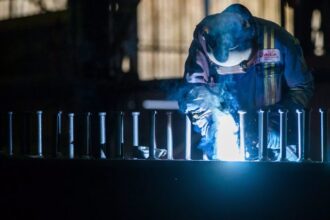In a landmark development for Quebec’s industrial sector, Alouette aluminum smelter has secured a crucial electricity agreement with the provincial government that will unlock a staggering $1.5 billion investment, potentially revitalizing the region’s manufacturing landscape and securing hundreds of high-paying jobs.
The agreement, announced Tuesday at the Sept-Îles facility, represents one of the most significant industrial investments in Quebec’s recent history. Premier François Legault, who personally attended the announcement, framed the deal as a strategic triumph for the province’s economic future.
“This partnership demonstrates Quebec’s commitment to maintaining our position as a global leader in aluminum production while embracing sustainable manufacturing practices,” Legault declared while touring the massive facility overlooking the St. Lawrence River.
The deal extends Alouette’s power contract through 2041 and provides the essential foundation for the company to proceed with a substantial modernization of its operations. Hydro-Québec will continue supplying the smelter with 940 megawatts of electricity—enough to power roughly 470,000 homes—under preferential industrial rates critical to maintaining international competitiveness.
What makes this agreement particularly significant is its timing amid global economic uncertainty. Aluminum production, a traditionally energy-intensive industry, has faced mounting pressure worldwide from rising electricity costs and stricter environmental regulations. The Quebec advantage of abundant hydroelectric power transforms what could have been a vulnerability into a distinct competitive edge.
Michel Desbiens, Alouette’s CEO, emphasized the importance of this electricity agreement for the company’s future: “With secure access to clean, reliable power at competitive rates, we can modernize our operations, reduce our carbon footprint, and maintain our position as North America’s largest aluminum smelter while creating substantial economic benefits for the region.”
The $1.5 billion investment will be directed toward upgrading production facilities, implementing cutting-edge technologies, and enhancing environmental performance. Industry analysts note this represents one of the largest single investments in Quebec’s industrial sector in recent years.
For the local economy, the implications extend far beyond the smelter itself. The Sept-Îles region, home to approximately 25,000 residents, relies heavily on the industrial jobs provided by operations like Alouette. This investment secures approximately 830 existing jobs while potentially creating hundreds more during the modernization phase and throughout the supply chain.
Quebec’s economic ministers view the agreement as validation of their industrial strategy, which emphasizes leveraging the province’s hydroelectric resources to attract and retain energy-intensive industries while simultaneously pushing them toward greater sustainability.
“This is precisely the kind of partnership we envision for Quebec’s industrial future,” stated Pierre Fitzgibbon, Minister of Economy, Innovation and Energy. “Clean energy powering advanced manufacturing with substantial local economic benefits.”
Environmental groups have offered measured responses, acknowledging the importance of maintaining industrial jobs while emphasizing the need for continuous improvement in environmental performance. The agreement reportedly includes specific targets for reducing greenhouse gas emissions and improving energy efficiency.
As global aluminum markets continue to evolve amid changing trade relationships and increasing demand from sectors like automotive manufacturing and renewable energy, Quebec’s position as a stable, environmentally responsible producer gains additional strategic importance for North American supply chains.
The agreement comes at a time when Canada’s relationship with its largest trading partner faces ongoing challenges. American tariffs on aluminum have periodically threatened the industry, making investments in modernization and efficiency all the more crucial for maintaining competitiveness regardless of trade policy fluctuations.
As Quebec charts its economic course through increasingly complex global markets, the question remains: Can the province’s strategy of leveraging clean energy assets to support traditional industries serve as a blueprint for industrial renewal across Canada, or will unique regional advantages limit its broader applicability?














